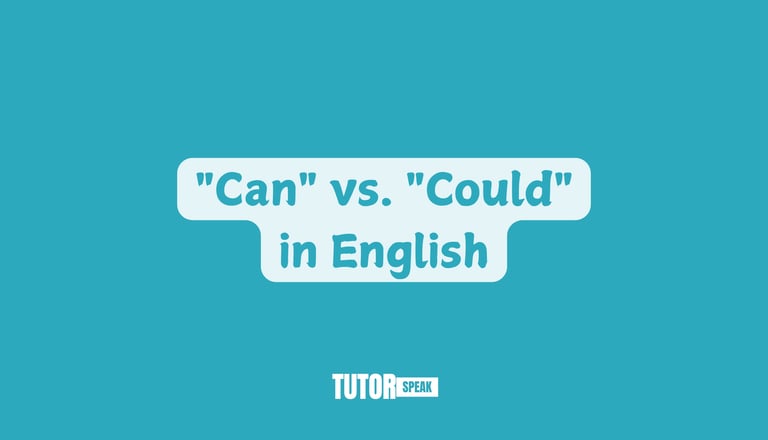"Can" vs. "Could" in English
"Can" and "Could" are modal verbs used to express ability, possibility, permission, and requests. While they share similarities, their uses differ based on tense, formality, and meaning.
TutorSpeak
12/17/20243 min read


"Can" vs. "Could" in English
"Can" and "Could" are modal verbs used to express ability, possibility, permission, and requests. While they share similarities, their uses differ based on tense, formality, and meaning.
1. To Express Ability
Can is used to express present or general ability to do something.
Could is used to express past ability or a conditional situation.
Examples:
Present ability: I can swim very well.
Past ability: When I was younger, I could run faster.
Conditional ability: If I had more time, I could help you.
2. To Express Possibility
Can is used to talk about things that are possible or likely.
Could is used to talk about less certain possibilities in the present, future, or conditional situations.
Examples:
General possibility: It can get very hot in Morocco during summer.
Less certain possibility: It could rain later this evening.
Conditional possibility: If we leave now, we could make it on time.
3. To Ask for or Grant Permission
Can is used to ask for or give permission informally.
Could is more polite and formal when asking for permission.
Examples:
Informal permission: Can I borrow your pen?
Polite permission: Could I borrow your pen, please?
Granting permission: You can go home now if you’re done.
4. To Make Requests
Can is used to make direct, informal requests.
Could is used to make polite, formal requests.
Examples:
Informal request: Can you help me with this?
Polite request: Could you help me with this, please?
Formal question: Could you pass me the salt?
5. To Make Suggestions or Offers
Could is used to make polite suggestions.
Can is used to offer help or assistance.
Examples:
Suggestion: We could watch a movie tonight.
Offer: I can help you with your homework.
6. In Negative Sentences
Can’t (cannot) is used to express an impossibility or lack of ability.
Couldn't is used to express something that was impossible in the past or to show politeness.
Examples:
Present: I can’t lift this heavy box.
Past: I couldn’t finish the project yesterday.
Polite refusal: I’m sorry, but I couldn’t help you with that.
7. "Could" for Hypothetical or Unreal Situations
Could is often used in conditional sentences to show something that might happen if a condition is met.
Examples:
If I had more money, I could travel the world.
You could get a promotion if you worked harder.
8. Politeness and Formality
Could is more polite and formal than can in requests, permissions, and suggestions.
Examples:
Can I come in? (informal)
Could I come in, please? (polite)
Uses of "Can" and "Could"
Ability
I can swim.
I could swim when I was 10.
Possibility
It can be difficult.
It could rain tomorrow.
Permission
Can I use your phone?
Could I use your phone?
Requests
Can you help me?
Could you help me, please?
Suggestions/Offers
I can help you with that.
We could try a new restaurant.
Negative Statements
I can’t do it.
I couldn’t do it yesterday.
Exercise 1: Choose the correct word (can/could).
I ___ play the guitar when I was a child.
___ you help me with this math problem?
You ___ get sick if you don’t wear a coat.
I ___ swim very well now, but I couldn’t last year.
___ I borrow your book, please?
Exercise 2: Rewrite the sentences using "can" or "could."
I was able to finish the work yesterday.
Is it possible for me to go out early today?
She is able to cook delicious meals.
Will you please help me with my project?
There’s a chance he’ll come to the party.
Exercise 3: Fill in the blanks with "can" or "could" in the correct form.
If I had more time, I ___ visit you more often.
Sorry, I ___ not hear what you said.
I ___ play tennis, but I’m not very good at it.
He said he ___ come tomorrow if he finishes his work.
We ___ see the mountains clearly from here.
Summary
"Can" and "Could" are essential modal verbs in English. While "can" is used for present abilities, possibilities, and informal requests, "could" is more formal, polite, and often used for past abilities or hypothetical situations. Understanding the difference between them will help you communicate clearly and appropriately in various contexts.



